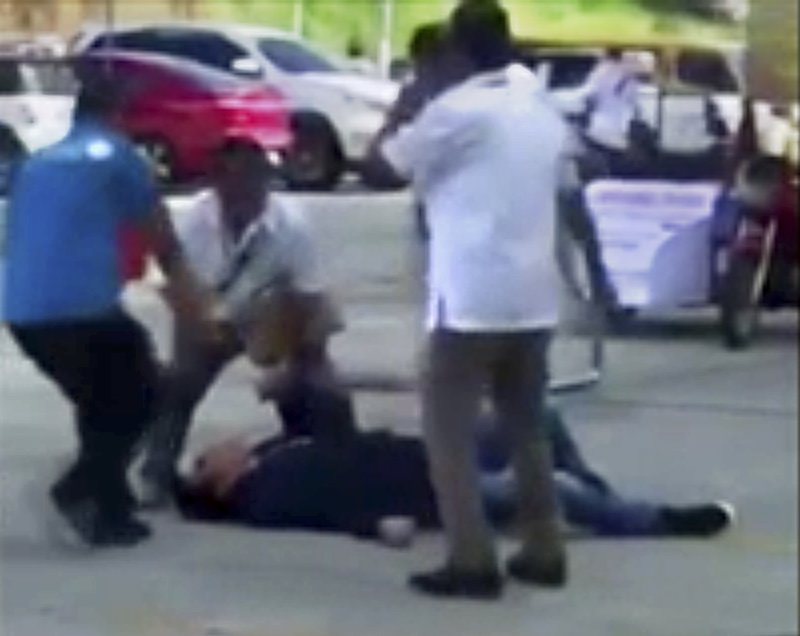TANAUAN, Philippines (AP) — A Philippine city mayor known for parading drug suspects in public but also alleged to have drug ties himself was shot and killed by a sniper Monday in a brazen attack during a flag-raising ceremony in front of hundreds of horrified employees and village leaders.
The apparent lone gunshot felled Mayor Antonio Halili of Tanauan City in Batangas province south of Manila as he and about 300 employees and newly elected village leaders sang the national anthem in a parking lot outside the city hall. The gunman escaped, police and witnesses said.
“I didn’t know that it was gunfire until people started screaming ‘Somebody’s shooting, somebody’s shooting’ while running in all directions and I saw my mayor slumped on the ground,” said village leader Rico Alcazar, who was in a crowd standing behind the 72-year-old Halili. “Everybody was shocked and it took sometime before some carried the mayor and brought him away in a car.”
Halili’s bodyguards opened fire toward a grassy hill where the gunshot was apparently fired, adding to the bedlam, Alcazar said by phone.
Cellphone video shot by Alcazar shows a few men standing around the fallen Halili as gunfire rings out continuously and people cry, scream, run and take cover during the melee. A man yells, ‘The mayor is dead, the mayor was shot,’ and another desperately calls for a car to take Halili to a hospital. A third man starts blaming his companions for the security breach.
“They did not see anybody approach him. They just heard a gunshot, so the assumption or allegation was it could have been a sniper shot,” the national police chief, Director-General Oscar Albayalde, said at a news conference in Manila, adding that an investigation was underway.
The bullet hit a cellphone in Halili’s coat pocket then pierced his chest, police said. Policemen scoured the hill but failed to find the gunman.
Philippine President Rodrigo Duterte expressed suspicion in a speech that the killing was linked to illegal drugs.
Two years ago, Halili ordered drug suspects to be paraded in public in Tanauan, a small city about 70 kilometers (43 miles) south of Manila, in a campaign that was dubbed “walks of shame.” The suspects were forced to wear cardboard signs that read “I’m a pusher, don’t emulate me” in a campaign that alarmed human rights officials.
Officials, however, also linked Halili to illegal drugs and removed his control over city police. Halili strongly denied the allegation and said at the time that he would resign and would be willing to be publicly paraded as a drug suspect if authorities could come up with evidence to support the allegation.
Tanauan information officer Gerardo Laresma said Halili had received death threats “left and right” from unknown people prior to the attack. Presidential spokesman Harry Roque condemned the violence.
Halili’s unusual campaign drew attention at a time of growing alarm over the rising number of killings of drug suspects under Duterte. Since Duterte took office in 2016, more than 4,200 drug suspects had been killed in clashes with police, alarming human rights groups, Western governments and U.N. rights watchdogs.
Duterte said the suspects died because they opened fire and sparked gunbattles with authorities, although human rights groups have accused police of extrajudicial killings.
Halili’s killing came a few weeks after a Catholic priest was shot and killed while preparing to celebrate Mass at the altar of a village chapel in northern Nueva Ecija province. Police announced Monday that four suspects in the killing of the Rev. Richmond Nilo have been taken into custody.
Sen. Panfilo Lacson, a former national police chief, urged the police to impose stricter firearms control in light of the killings.
“The killing of priests, prosecutors and former and incumbent local officials in broad daylight and in full view of the public may be suggestive of the impunity and brazenness of those responsible for such acts,” Lacson said.
“The Philippine National Police should feel challenged, if not taunted,” he said. “And they must immediately consider stricter firearms control strategies before similar killings could reach ubiquitous levels.”
___
This article was written by AARON FAVILA and JOEAL CALUPITAN, Associated Press writers.






